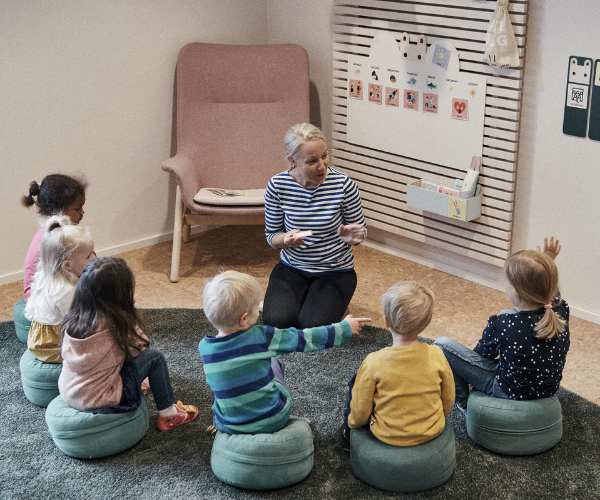6 Reasons Why Finnish Early Childhood Education is Excellent

1. Finland takes a holistic approach to children’s learning.
Early childhood education in Finland is grounded in the belief that childhood is a valuable period of life. Children are respected as individuals and whole persons, so emphasis is placed on their overall growth, development, health and wellbeing, not just on academic skills. The aim is to educate children who are socially, emotionally and academically confident and capable. This all-inclusive approach allows children to develop their creativity, curiosity and self-expression as well as skills like mathematics and linguistics. They develop transversal competencies that help them succeed in future learning.
2. Children learn through play.
Studies show that children develop all sorts of skills through play, such as cognitive, social, emotional, physical and critical thinking abilities. It also lets them learn on a developmentally appropriate level, which varies from child to child. Pre-primary education teachers use play as a pedagogical tool in day-to-day learning because it is a natural and effective way for children to learn. It also lets them participate and be active participants in their own learning process.
Are you a preschool or kindergarten owner looking to bring this sort of progressive education to your region? Consider the HEI Schools Toolkit, an online subscription that brings the Finnish curriculum online to schools around the world! Attend our webinar to learn more.

HEI Schools San Rafael
3. Children are not tested.
In the early years, children are not tested on the progress of their learning. Rather, teachers use observational tools and assessments to monitor children’s development. They work together with parents and guardians to create an individual learning plan for each child, and they collectively review these plans at regular intervals to monitor a child’s strengths, development needs and growths in different learning areas. These plans are also helpful in identifying when children need special or additional support from other professionals, such as speech therapists or occupational therapists, so that many learning challenges can be addressed before the child begins school.
4. Teachers are highly trained.
Finland’s educational system highly values teachers and their role in children’s successful learning. Teaching is a highly-respected and well-regarded profession, and early educators must hold a degree in early childhood education and other caregivers must have upper secondarily level qualifications in social welfare and healthcare to work in daycares. Teachers are also highly independent in their classrooms, and they also take responsibility for their own learning process. They are encouraged to be creative and adapt the curriculum to suit the individual children in their care. (Read more about how teachers are trained in Finland!)
If you’re a teacher looking to improve your professional skills and learn more about Finnish pedagogy, consider the HEI Schools Teacher Diploma, an online work-study program developed in collaboration with University of Helsinki. Join our weekly webinar to learn more!

HEI Schools Senayan
5. There is a focus on children’s strengths.
A positive, strength-based approach, focuses on what a child does well, rather than what they do ‘wrong’, and a growing body of research and evidence supports this approach as a good way to teach children. Children show their learning in different ways, and the teachers build upon their strengths and provide the instructional support and strategies that work for each child. This approach helps teachers, children and families build a realistic but positive plan to support children’s learning and development.
6. Children learn sisu, or resilience.
Finland is known for the concept of sisu, which is the courage to move forward when things get tough. It is a universal human quality that we all have within us - we just need to be able to access it. In Finland, children discover their own sense of sisu, or resilience, because they learn how to think for themselves, to love learning, to solve problems, to express how they feel, and to value their own and other’s opinion. People with sisu also acknowledge that we are all in this together, which is why children grow up to understand the importance of working together, braving discomfort, viewing mistakes as learning tools and persevering against the odds as a team.
All of these components add up to an educational system that values children as individuals, lets them learn at their own pace while reaching their full potential and supports their holistic growth and wellbeing. This approach gears children for future success while allowing them to simply be children and experience the joy of childhood.
Letting children learn at their own pace
At HEI Schools, we build our curriculum based on the foundations of Finnish early childhood pedagogy in collaboration with our academic partner, University of Helsinki. Our mission is to bring Finnish education to as many children as possible, and we partner with businesses and schools around the world to achieve this goal.
If you’re a school owner and want to incorporate these concepts into your preschool or kindergarten, consider the HEI Schools Toolkit. It brings the best of Finnish pedagogy online for schools around the world. Watching our webinar recording to learn more!






